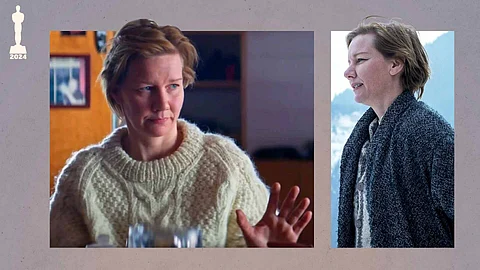
- Reviews
- Power List 2024
- Cannes 2024
- In-Depth Stories
- Web Stories
- News
- FC Lists
- Interviews
- Features
- FC SpecialsFC Specials

During the making of Anatomy of a Fall (2023) — Justine Triet’s crisp courtroom drama about a woman being tried for the murder of her husband — Sandra Hüller repeatedly nudged Triet to spill if Sandra (the character) was actually culpable. (This is Hüller and Triet’s second collaboration after Sibyl (2019).) Triet refused to clarify, leaving it to the actor to arrive at her own vantage point. If this left Hüller at a loss, you won’t spot any troubling ambiguity in her performance.
In Triet’s film, we are privy to an unhappy marriage of two writers where the husband, Samuel (Samuel Theis), thinks his wife’s success is “quite castrating”. Meanwhile, Sandra thinks that her husband, who has taken on the bulk of the domestic duties, uses what appears as generosity to hide something “dirtier and meaner”. This corrosive dynamic is used against Sandra when Samuel is found dead at their property. The possibilities are that he accidentally fell from the balcony, took his own life; or Sandra killed him. Anatomy of A Fall begins as a police investigation and then becomes a dissection of a marriage in court, around which gendered presumptions swirl and impose, creating a fog of uncertainty about Sandra’s role in Samuel’s death. Also roped into this debacle is the question of how much prejudice a successful woman must contend with, especially when she’s outed as bisexual and an inattentive mother.
As Sandra, Hüller textures the character with an invulnerability even during the moments of flourishing straightforwardness, like, when she frankly divulges the details of her marriage to her lawyer, who then chides her to be more diplomatic. Later, when Sandra admits to the court that she might have furnished some inconsequential details so as to not seem guilty, you remain unsure if she lied because she was aware of court’s bias upon her lawyer’s advice, or if she is truly guilty, but latching onto the narrative of the former to absolve herself. You would think one crucial detail would help you neatly reason her complicity in the homicide (or the lack of it), but the film dexterously doles out facts that never let us feel comfortable within one stance, and in the process, transcends the tedious question of whether, she in fact, murdered him.
Through the length of the film, as you flit between feeling secure in rooting for her, or questioning how your own bias is colouring the way you purpose the facts, as Sandra Voyter, Hüller paradoxically becomes both the emotional anchor, and the itching detail in the investigation. What floats above the cesspool of uncertainty is Hüller’s composed directness: as terrifying as it is pitiable; as unsettling as it is reassuring; and as transparent as it is inaccessible.